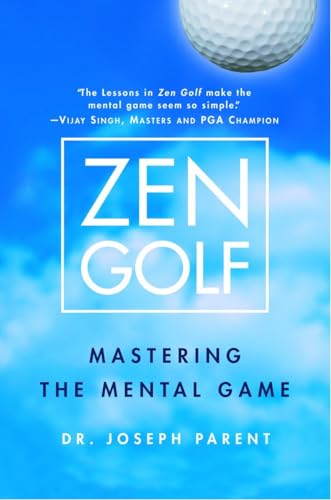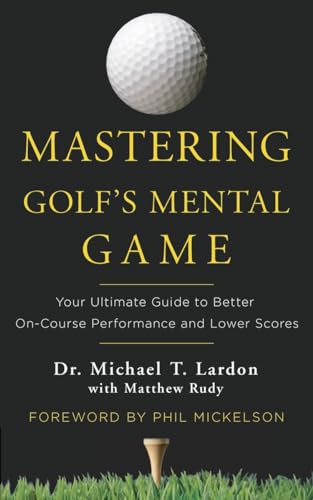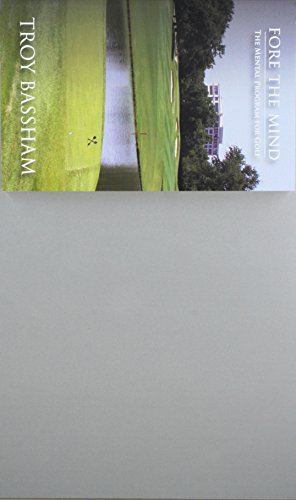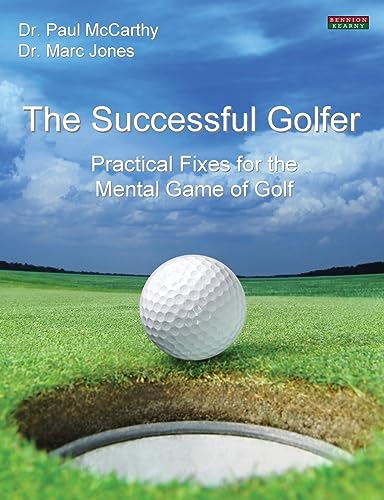As we all know, golf is not just a game of swings and putts; it’s a mental challenge that can make or break even the most skilled players. While many golfers invest hours perfecting their physical game, the mental aspect often remains an untapped reservoir of potential.
Legends like Phil Mickelson have often emphasized the significance of mental preparation, turning to sports psychologists for that extra edge. But what about passionate golfers like us, who may not have access to such professional guidance? How do we harness the power of the mind to elevate our game?
Drawing from my extensive experience in golf, having played since my early years and witnessed the transformative power of a strong mental game, I’ve curated a list of the best golf psychology books. These books are more than just reads; they’re tools that have the potential to reshape your approach to golf, giving you a competitive advantage on the course.
So, if you’re ready to delve deep into the mental intricacies of golf and discover strategies that even some pros might overlook, keep reading. Let’s embark on this journey to unlock the true potential of your golfing mind.
*Some of the links in this page will be affiliate links, this means that if you purchase after following one, I make a small commission from the sale at no additional cost to yourself. Take a look at our About Us page for more info on this.
Top Picks – Best Golf Books for Mental Game
1. The Inner Game of Golf

The Inner Game of Golf was written by W. Timothy Gallaway and is among some of the bestselling golf books. It delivers strategies to achieve potential–both in the crucible of competition and in everyday life, and has been touted by many as one of the including Inside Golf who have proclaimed it to be “The best sports psychology book ever written about golf.”
With Gallwey as a guide, you’ll learn how to: defeat your mental demons and find clarity under pressure, dispel tensions that can sabotage your performance, build confidence and overcome insecurities that can hijack your best instincts, employ the art of “relaxed concentration” to improve your swing, your game, and your life.
Regardless of your skill set, Gallway’s pioneering strategies, real-life examples, and illuminating advice are perfect for anyone striving to be a champion on and off the course. Inside Golf called it, “The best sports psychology book ever written about golf”. This is a great value book for such a low price. Additionally, it is rated over four stars with just over 300 ratings, so you know it is a must-read.
2. Simplicity

This book is the newest on the shelf of golf books in this list since it was written just over two months ago. Officially coming onto the market on August 29, 2020 it only has twenty five reviews, but each one has been a full five stars.
Golfers live in a world of continual experimentation. Every week, and sometimes every day they are constantly trying new things to improve their game. Basically, they have sentenced themselves to an eternal search for an elusive goal. Search no more. There is one process in the mind that when accessed, allows golfers to not only access their best swings, but to make any self-corrections in their swing.
This is the ‘holy grail’, the goal every golfer seeks. This process is called the fluid motion factor. The only problem is golfers never know when they will access this one simple neurophysiological process, and when it leaves, where to look to get it back. In a revolutionary book that is sure to shake up the golf clubs industry, Steven Yellin’s Simplicity: The Fluid Motion Factor Program teaches a simple and powerful program that allows golfers to access that process and enter that elusive zone of consistent golf.
3. Golf is Not a Game of Perfect

Golfers must learn to love ‘the challenge when they hit a ball into the rough, trees, or sand. The alternatives—anger, fear, whining, and cheating—do no good.
Golf is Not a Game of Perfect
Dr. Bob Rotella is one of the hottest performance consultants in America today. Nick Price (last year’s Player of the Year), Tom Kite, Davis Love III, Pat Bradley, Brad Faxon, John Daly, and many other PGA tour mainstays are among his many professional clients.
Rotella, or “Doc,” as most players refer to him, goes beyond just the usual mental aspects of the game and the reliance on specific techniques in this masterstroke of golf books. What Rotella does here in Golf is Not a Game of Perfect, and with his clients, is to create an attitude and a mindset about all aspects of a golfer’s game, from mental preparation to competition.
The most wonderful aspect of this golf book is that it is done in a conversational fashion, in a dynamic blend of anecdote and lesson. And, as some of the world’s greatest golfers will attest, the results are spectacular. Golfers will improve their mental golf game and have more fun playing. Filled with delightful and insightful stories about golf and the golfers Dr. Bob Rotella works with, Golf Is Not a Game of Perfect will improve the game of even the most casual weekend player.
4. Fearless Golf: Conquering the Mental Game

As Jack Nicklaus once observed, fear is the golfer’s greatest enemy, inspiring Tiger Woods to “refuse” to give in to this debilitating emotion. It can turn professionals into jelly and dominate the games of most amateurs. It alters swing paths, causes “tap-in” putts to go awry, and transforms a golfer from a brilliant shot-maker on the practice range into an incompetent hack on the course of the game of golf.
If you’re racking up an interest in golf, you cannot underestimate the mental side that golf books like this help you keep under control.
Most golfers understand this, but do not have the tools to overcome it. That’s where Dr. Gio Valiante comes in with his book Fearless Golf: Conquering the Mantal Game. A pioneering sports psychologist, Valiante has studied the sources of an athlete’s fear, investigated the physiological and neurological impact of fear on performance, and, most important of all, developed a groundbreaking program for conquering it.
Emphasizing the need to replace fixation-on-results with a commitment to mastery of one’s body and one’s mind, Valiante’s approach will not only help golfers reach their true potential, it will make playing every round fun again. Through concrete confidence and mastery drills, he presents specific ways readers can break free of fear’s grasp and perform at their best—even under the most extreme pressure.
5. Zen Golf: Mastering the Mental Game

“The lessons in Zen Golf make the mental game seem so simple. Dr. Parent has given me very effective methods for working with thoughts and emotions, and for taking the negatives out of the picture.”
Vijay Singh, Masters and PGA Champion
The best players know that golf is a game of confidence and most importantly, concentration–the ability to focus and block out distractions. The goal of achieving clear thought is also at the heart of Buddhist teachings.
In his highly original and groundbreaking book, noted PGA coach and Buddhist instructor, Dr. Joseph Parent, draws on this natural connection to the mental side of the game of golf and teaches golfers how to clear their minds, achieve ultimate focus, and play in the moment for each shot.
Zen Golf is among the books on the mental side of golf as it presents a simple system for building “mental game mastery.” Joseph Parent’s unique PAR Approach (focusing on Preparation, Action, and Response to Results) guides golfers with specific techniques for each aspect of their games.
In chapters such as “How to Get From the Practice Tee to the First Tee”, “You Produce What You Fear”, and “How to Enjoy a Bad Round of Golf”, the author shares a personal teaching regimen that has helped improve the games of professionals and amateurs alike. By combining classic insights and stories from Zen tradition, Zen Golf helps eliminate the mental distractions that routinely cause poor shots and loss of concentration, allowing golfers to feel in “the zone” that professionals have learned to master.
- Provides golfers with simple yet powerful techniques to prepare for, execute, and respond to the results of any golf shot
6. Mastering Golf Mental Game: Your Ultimate Guide to Better On-Course Performance and Lower Scores

To be a golfer is to tinker – with everything from equipment to grip to swing. But one thing most players don’t give enough attention to is the golf mental game. Psychologists aren’t a new phenomenon in golf, but Dr. Michael Lardon is a different breed of performance coach. Instead of sending his players into a losing battle against emotion, indecision, and fear on the golf course, he shows them how to organize their thoughts and use them for maximum performance.
His step-by-step Pre-Shot Pyramid provides any player with the ideal blueprint for shot setup, and his revolutionary Mental Scorecard will give you the tools to accurately measure what you really do on the golf course. You will learn the same techniques that Dr. Lardon shares with Phil Mickelson and dozens of other tour players, including the tools that helped Mickelson right himself after the 2012 U.S. Open to win the British Open a month later with a historic final round.
Mastering Golf’s Mental Game will change the way you think about golf, and is a must-listen for any player serious about shooting better scores and getting more enjoyment out of the game.
7. Fore the Mind – The Mental Program for Golf

Lessons from an unknown mentor transform a competitive player’s mental approach to golf. Struggling on tour Kevin needs to gain consistency. Written lessons start to appear in his golf bag that transforms his game from inconsistent to reliable.
Troy Bassham uses this short, unique and compelling story to grab the attention of the reader while outlining the Mental Management Mental Program for competitive golf. This book creates a simple step by step program that leads to instant results on your scorecard and in your mind. Not only will you shoot better scores, but you will be happier while you do so.
Even if you have a bad day this mental program will help you stay calm and keep your cool no matter the score. For only fifteen dollars and a five year old book, Fore the Mind – The Mental Program for Golf will get your game into shape much better than a two hundred dollar lesson could.
- Troy Bassham (Author)
8. The Psychology of Tournament Golf

There is certainly no other day like game day. It’s the day your score is posted for the world to see. It’s a day filled with competitive pressure and unforeseen adversity. To succeed on game day you have to have freedom in the chaos.
In The Psychology of Tournament Golf Dr. Cook delivers his PGA Tour tested strategies for playing your best when it means the most. This game day primer will direct your steps from the moment you wake up on tournament day until you debrief after the round. You will also discover a revolutionary secret to the game that brings together the mental and mechanical aspects of the swing and putting.
In the bonus sections Dr. Cook introduces both the Utopia Pre-Set Swing and Face-on Putting. These techniques will fuel the imagination of those seeking a competitive advantage on game day. Although this book is specifically written about tournament golf, it is still very applicable to weekend golfers of all ages, and that’s how its amassed favour to become one of the best selling golf books around.
9. Golf Psychology – When Positive Thinking Doesn’t Work

An alternative to popular positive thinking, this groundbreaking audiobook on golf psychology, reveals the practical mindfulness, techniques, and philosophies that will help you to play your best golf when it matters.
Author Jon Adler has worked with touring professionals and amateurs for over 10 years, helping them to overcome mental problems and blocks by developing the art of relaxed concentration. What do you do when positive thinking stops working? Really, I’m serious. If you have ever tried being really positive while playing golf, you may have experienced some success, but what do you do when you start playing poorly?
It is very hard to keep positive when you have no idea where the ball is going. I tried the positive thinking route myself and when things got tough the only explanation for my poor performance was that I was not being positive enough. This book has a brand new perspective on the common “positive” thinking mindset that we golfers share around the world.
- Amazon Kindle Edition
10. The Successful Golfer: Practical Fixes for the Mental Game of Golf

You do not have to play many rounds of golf to understand how much of the game is played in the mind. Different courses, conditions, and shot requirements all present unique challenges that need focus and mental strength from the winning player. In turn, moving from the practice range onto the golf course can often magically produce drops in concentration, increased frustration, and unexpected self-doubt: drives go wayward, three foot putts get missed, and water features seem to become magnets.
The Successful Golfer is designed to help address 50 of the most common faults that players experience and which hold them back. These include: hitting the self-destruct button when winning, nervousness on the first tee, lost confidence, failing to practise as you play, losing focus off poor drives, and many more. Each fault is remedied with a clear practical fix. You will learn to develop effective practice plans, build a dependable pre-shot routine, cope with the pressures of competitive golf, and deal with distractions.
- McCarthy, Paul (Author)
The Best Golf Psychology Book
After delving deep into the world of golf psychology and meticulously analyzing various books on the subject, one title stands out as the pinnacle: Golf is Not a Game of Perfect.
Its overwhelming acclaim, reflected in over a thousand reviews averaging a stellar four and a half stars, resonates with my own assessment. But it’s not just the sheer volume of positive feedback that makes this book a must-read.
The true essence of its value lies in the expertise of its author, Dr. Bob Rotella. Recognized as one of America’s leading performance consultants, Dr. Rotella’s insights are backed by his extensive work with golfing legends. Names like Nick Price, Tom Kite, Davis Love III, and John Daly, among others, have benefited from his wisdom. Such a clientele list isn’t just impressive; it’s a testament to his unparalleled understanding of the game’s mental dimension.
While Golf is Not a Game of Perfect might come with a slightly higher price tag at $25, it’s an investment in knowledge from one of the best in the business. If you’re serious about elevating your golf game, this book isn’t just a recommendation—it’s essential reading.













